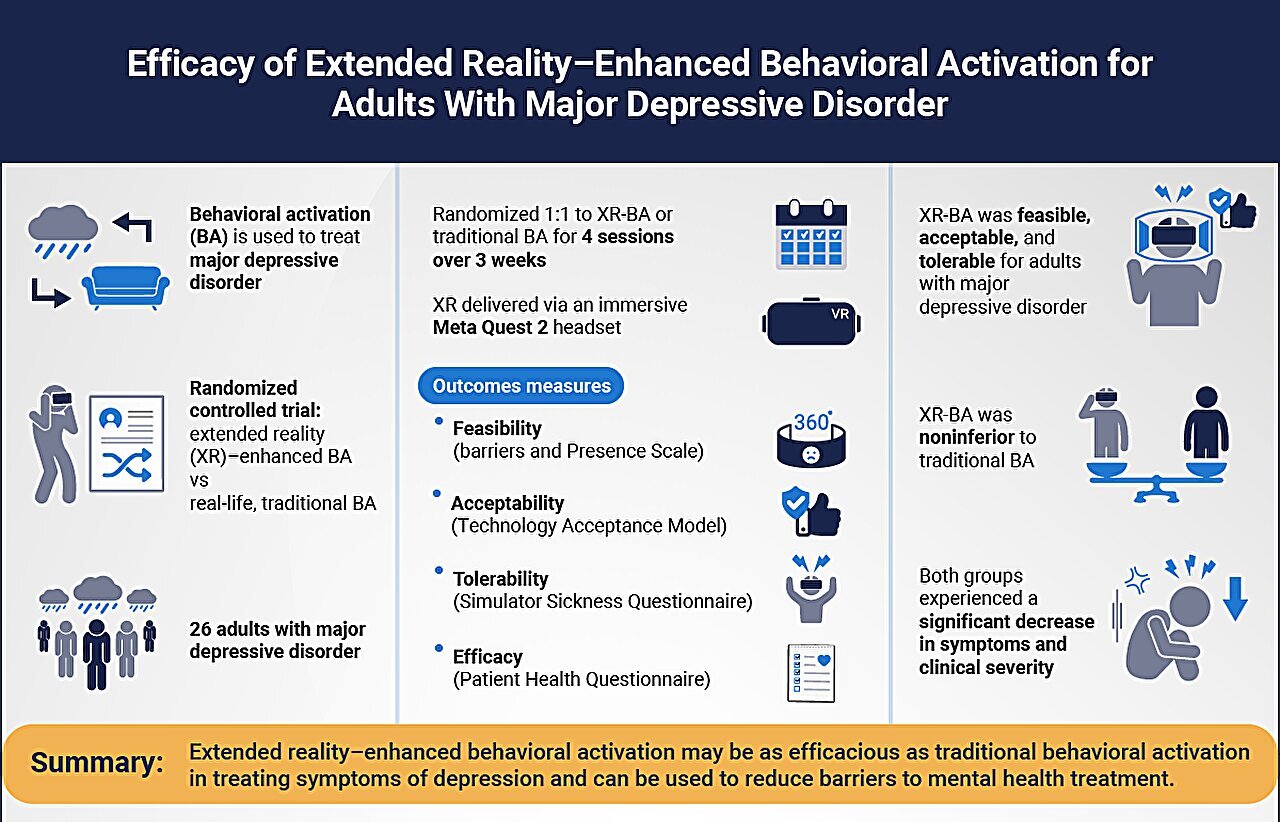A recent study published in JMIR Mental Health sheds light on the promising role of virtual reality (VR) in treating major depressive disorder (MDD).
Titled “Examining the Efficacy of Extended Reality–Enhanced Behavioral Activation for Adults With Major Depressive Disorder: Randomized Controlled Trial,” the research, led by Dr. Margot Paul and team from Stanford University, has unveiled the effectiveness of extended reality (XR)–enhanced behavioral activation (XR-BA) in easing symptoms of depression.
MDD affects millions worldwide, and access to evidence-based psychotherapies remains a challenge for many. Traditional treatments often encounter obstacles, prompting researchers to explore innovative solutions.
XR, which includes VR, encompasses various immersive technologies involving computer-generated environments that blend physical and digital worlds. Leveraging the immersive power of XR, this study explored XR-BA as a potential game-changer in MDD treatment.
Dr. Paul and team conducted a randomized controlled trial among 26 outpatients with MDD receiving remote care. Using a VR Meta Quest 2 headset, the participants engaged in simulated pleasant or mastery activities, including playing a magical VR board game, deciphering clues to solve puzzles, dancing to music, and playing mini-golf alone or with friends.
Though the learning curve for using the headset was high, participants reported that the experience became more enjoyable and useful over time.
The results were comparable to traditional behavioral activation delivered via telehealth. Both XR-BA and traditional behavioral activation helped reduce the severity of depression in a significant way, as measured by the Patient Health Questionnaire–9.
Moreover, the findings suggest that individuals in the XR-BA group might have experienced a heightened expectancy or placebo response because of the novelty of the technology and implicit beliefs regarding mental health treatment.
“These results indicate that XR may help to destigmatize mental health care and reduce barriers to individuals seeking care. Clinicians could use XR as a treatment tool to help motivate clients to actively participate in their psychotherapy treatment by completing ‘homework’ that is novel, fun, and accessible,” remarked Dr. Paul.
The study underscores the potential of VR, particularly XR-BA, in revolutionizing depression treatment by offering efficacy akin to traditional therapy. This is a promising avenue for enhancing treatment outcomes and addressing barriers to accessing evidence-based psychotherapies for MDD, potentially expanding care for affected individuals.
Additionally, the exploration of XR’s capacity to amplify placebo effects hints at the transformative possibilities of technology-assisted mental health therapies.
More information:
Margot Paul et al, Examining the Efficacy of Extended Reality–Enhanced Behavioral Activation for Adults With Major Depressive Disorder: Randomized Controlled Trial, JMIR Mental Health (2024). DOI: 10.2196/52326
Provided by
JMIR Publications
Citation:
Beyond therapy: Virtual reality shows promise in fighting depression (2024, May 6)
retrieved 6 May 2024
from https://medicalxpress.com/news/2024-05-therapy-virtual-reality-depression.html
This document is subject to copyright. Apart from any fair dealing for the purpose of private study or research, no
part may be reproduced without the written permission. The content is provided for information purposes only.
